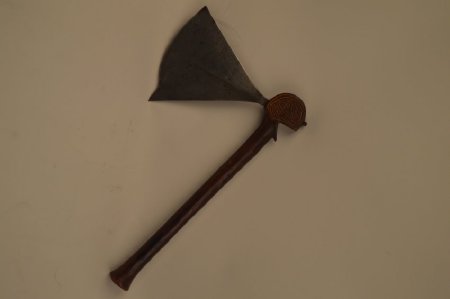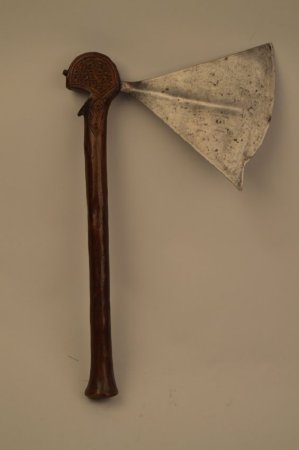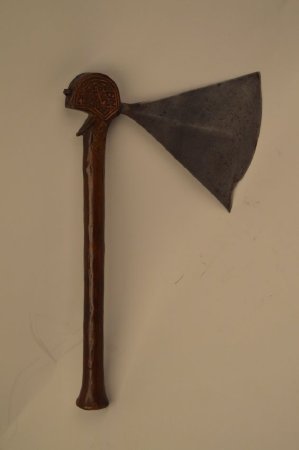Title:
Songye Parade Axe
Object Name:
Axe, Ceremonial
Other Name:
Axe or Staff, Ceremonial
Place of Origin:
Songye, Democratic Republic of Congo, Africa
Provenance:
Aboriginal Indigenous Art.
H = 16"
W = 9—3/4"
D = 1—1/2"
The Songye are famous for their metal axes decorated with faces.
c. 1920
Songye origins are shared with the Luba through a common mythical Songye ancestor known as Kongolo, who can be traced through lineages to the 16th century. The linguistic traditions of these neighboring peoples are intertwined as well. It is believed that the founders of the Songye emerged from the lake region in Shaba province to the south in the heart of the Luba homeland. The Lomani River divides Songye territory and marks the boundary of the areas invaded by the Luba. As a result of these geographic and political differences there emerged of two distinct social structures among the eastern and western Songye and two stylistic differences in art forms between the two areas.
H = 16"
W = 9—3/4"
D = 1—1/2"
The Songye are famous for their metal axes decorated with faces.
c. 1920
Songye origins are shared with the Luba through a common mythical Songye ancestor known as Kongolo, who can be traced through lineages to the 16th century. The linguistic traditions of these neighboring peoples are intertwined as well. It is believed that the founders of the Songye emerged from the lake region in Shaba province to the south in the heart of the Luba homeland. The Lomani River divides Songye territory and marks the boundary of the areas invaded by the Luba. As a result of these geographic and political differences there emerged of two distinct social structures among the eastern and western Songye and two stylistic differences in art forms between the two areas.
Description:
Well—polished long wooden handle, with flanged end at bottom and flat oval geometric criss—cross design on side at top with attached blade flattened into a wide fan—like shape with an undulating cutting edge.
Collection:
Finley Collection
Material:
Wood W/Metal
Used:
Ritually Used
Technique:
Carving / Metal Working
Owned:
Art Department, MSSU
Accession#:
2014.1.120


